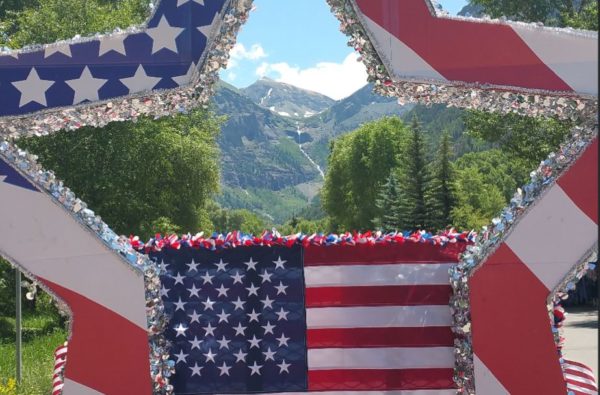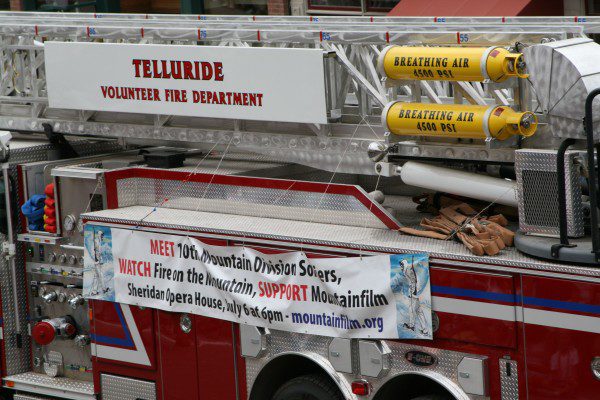
02 Jul Happy Fourth of July Weekend!
Go here for details about the Town of Telluride’s Fourth of July bash.

The original resolution calling for the Continental Congress to declare the United States free from British rule was introduced by Richard Henry Lee of Virginia on June 7, 1776. Three days later, a committee headed by Thomas Jefferson was appointed to prepare a document appropriate to the cause.
The Fourth of July, a brief history & remembering the signers – because freedom is never free.
The Declaration of Independence was adopted by Congress on July 4, although the resolution that led to its writing had been approved two days earlier, prompting President James Adams to say:
“The second day of July 1776 will be the most memorable epoch in the history of America. I am apt to believe that it will be celebrated by succeeding generations as the great anniversary festival. It ought to be commemorated as the Day of Deliverance by solemn acts of devotion to God Almighty. It ought to be solemnized with pomp and parade, with shows, games, sports, fun, bells, bonfires and illumination from one end of this continent to the other from this time forward forever more.” (From “John Adams” by David McCullough.)
Apart from slipping two days on the calendar to July 4, a ho-hum day back in Adams’ time, his vision became tradition: the Fourth of July became a big birthday party our nation throws for itself.
Ever wonder what stuff these signers were made of – and what happened to the 56 who set the stage for our democracy?
According to various online sources the following is a rundown:

Most were lawyers and jurists. Some were merchants. A number were farmers and large plantation owners. They all signed the Declaration of Independence knowing full well that the penalties for doing so would be harsh; death if they or their loved ones were captured.
For example:
Five signers were captured by the British as traitors and tortured before they died.
Twelve had their homes ransacked and burned.
Two lost their sons serving in the Revolutionary Army; another had two sons captured.
Nine of the 56 fought and died from wounds or the hardships of the Revolutionary War.
Specifically:
Carter Braxton of Virginia, a wealthy planter and trader, saw his ships swept from the seas by the British Navy. He sold his home and properties to pay his debts and died in rags.
Thomas McKeam was so hounded by the British that he was forced to move his family almost constantly. He served in the Congress without pay and kept his family in hiding. McKeam’s possessions were taken from him; poverty was his reward.
Vandals or soldiers looted the properties of Hall, Clymer, Walton, Gwinnett, Heyward, Ruttledge, and Middleton.
At the battle of Yorktown, Thomas Nelson, Jr., noted that the British General Cornwallis had taken over the Nelson home for headquarters. H urged General George Washington to open fire. The home was destroyed and Nelson died bankrupt.
Francis Lewis had his home and properties destroyed. The enemy jailed his wife, who died within a few months.
John Hart was driven from his wife’s bedside as she was dying. Their 13 children fled for their lives. His fields and gristmill were laid waste. For more than a year, he lived in forests and caves, returning home to find his wife dead and his children vanished. He soon died from exhaustion and a broken heart.
Norris and Livingston suffered similar fates.
Such were the stories and sacrifices of the American Revolution. Those soft-spoken men of means and education had security – but they valued liberty more pledging:
“For the support of this declaration, with firm reliance on the protection of the divine providence, we mutually pledge to each other, our lives, our fortunes, and our sacred honor.”
Are we raining on your (July 4th) parade?
If yes, it is only because too often we take our liberties for granted.
So we might want to take a few minutes while enjoying the weekend of the Fourth to silently thank the signers, those patriots who sacrificed so much so future Americans could live as we do: in freedom.
But freedom is never free. It comes at a price.
And our democracy is not a given..
Two good reasons why on the Fourth of July weekend of 2021 we might consider putting aside Red state/Blue state differences and, per F. Scott Fitzgerald, “stand at moral attention,” saluting the Stars and Stripes as one nation.
Over this weekend, we might also want to take a moment to honor the young men and women who put on uniforms, boarded trains and planes and promised their families they would return – knowing full well they might not be back at all.
The Fourth of July in Telluride region:
In Telluride the tradition, which began in the 1880s, had gotten out of control some time in the early 1970s. Town cancelled the Fourth of July party until further notice. When the holiday was reinstated on the summer calendar a year or two later, the main event was a bbq and fireworks sponsored by the Fire Department.
Period.
(Read, no parade.)

In late-1980s, thanks to the efforts of Joyce Allred and Shari Flatt, the parade returned to its past glory. Now almost everyone in town participates.
“If it weren’t for the tourists, there may be no spectators at all,” Joyce said.
On the Fourth of July, people tend to put red state/blue state issues aside and, per F. Scott Fitzgerald, “stand at moral attention,” saluting the Stars and Stripes as one nation. On that day, we honor the young men and women who put on uniforms, boarded trains and planes and promised their families they would return, knowing full well they might not be back at all.
Telluride’s spin on the Fourth includes the parade straight out of Norman Rockwell, a flyover, kids, dogs, horses, floats, wagons, bikes, bbq, men and women in uniform and the crowd of cheerleaders.
The Sheridan Arts Foundation hosts Telluride Plein Air.
There are also big happenings in Mountain Village.


Sorry, the comment form is closed at this time.